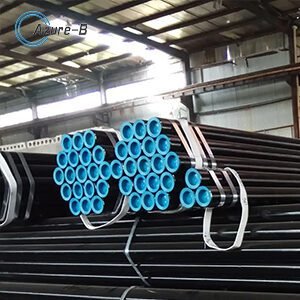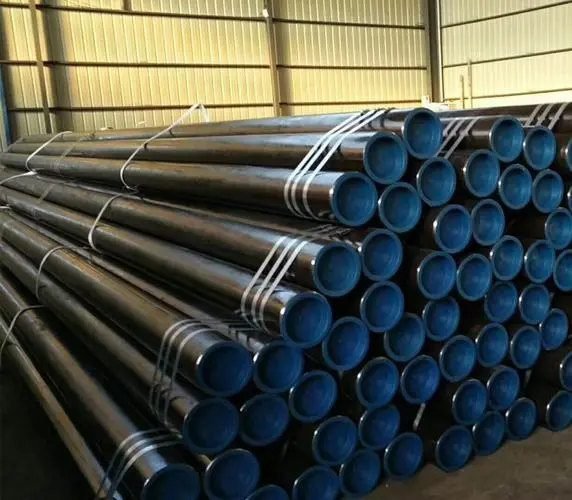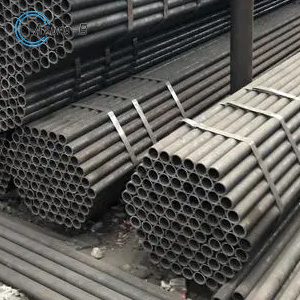alloy steel pipe supplier
Alloy steel pipes are a crucial component in various industrial applications due to their enhanced properties compared to carbon steel pipes.
Description
Alloy steel pipes are a crucial component in various industrial applications due to their enhanced properties compared to carbon steel pipes. Here’s an overview of their characteristics, uses, and types:
Characteristics
Composition: Alloy steel pipes are made by combining carbon steel with various alloying elements such as chromium, molybdenum, nickel, and vanadium. The specific composition varies depending on the desired properties.
Strength and Durability: The addition of alloying elements generally increases the strength, hardness, and durability of the steel. This makes alloy steel pipes more suitable for high-stress applications.
Corrosion Resistance: Certain types of alloy steel pipes offer improved corrosion resistance, which is critical in environments where exposure to chemicals or corrosive substances is common.
Heat Resistance: Many alloy steels can withstand higher temperatures without losing strength, making them ideal for high-temperature applications.
Common Uses
Oil and Gas Industry: Used for drilling and transporting oil and natural gas due to their strength and corrosion resistance.
Power Plants: Utilized in high-temperature and high-pressure environments found in boilers and steam systems.
Chemical Industry: Employed in chemical processing plants due to their ability to withstand corrosive substances.
Construction and Infrastructure: Used in structures that require strong, durable materials, like bridges and buildings.
Automotive and Aviation Industries: Components in vehicles and aircraft often use alloy steel for its strength-to-weight ratio.
Types of Alloy Steel Pipes
Chromium Alloy Pipes: Ideal for high-temperature service, often used in power plants.
Nickel Alloy Pipes: Known for their excellent corrosion resistance, making them suitable for chemical processing environments.
Chromium-Molybdenum (Chrome-Moly) Pipes: Commonly used in the oil and gas industry, these pipes offer good strength and resistance to heat.
High-Pressure Alloy Steel Pipes: Designed for high-pressure applications, commonly used in power generation and petrochemical industries.
When selecting an alloy steel pipe, it’s essential to consider the specific requirements of your application, including the type of medium it will be exposed to (e.g., corrosive substances, temperatures), the pressures it needs to withstand, and any industry-specific standards or certifications required. Consulting with a knowledgeable supplier or engineer can help ensure you choose the right type of alloy steel pipe for your needs.

- 8 SCH 120 Carbon Steel Pipe
Leave us a message
Related Products
Related Products
- tag -->
- NoDisplayProduct
High-Quality SS400 Steel Pipe: Durable & Versatile for Various Applications
Rated 0 out of 5Read more - NoDisplayProduct
High-Quality Steel Pipe Fittings: Durable and Versatile Solutions for Various Applications
Rated 0 out of 5Read more - NoDisplayProduct
Premium Stainless Steel Pipe Fittings: Durable & Versatile Solutions
Rated 0 out of 5Read more - NoDisplayProduct
Premium Stainless Tube: Durable & Versatile Tubing Solutions for Various Applications
Rated 0 out of 5Read more - NoDisplayProduct
Achieve Superior Quality with ASTM A106: The Ultimate Guide and Benefits
Rated 0 out of 5Read more - NoDisplayProduct
High-Quality Carbon Steel Pipe: Durable & Versatile Piping Solution
Rated 0 out of 5Read more - NoDisplayProduct
High-Quality SST Tubing: Durable and Versatile Stainless Steel Tubes
Rated 0 out of 5Read more - NoDisplayProduct
High-Quality Stainless Steel Pipes: Durable and Versatile Solutions for Various Applications
Rated 0 out of 5Read more - NoDisplayProduct
High-Quality Galvanized Steel Pipe: Durable & Corrosion-Resistant Solutions
Rated 0 out of 5Read more - NoDisplayProduct
High-Quality Stainless Steel Tubes: Durable, Versatile, and Affordable
Rated 0 out of 5Read more




